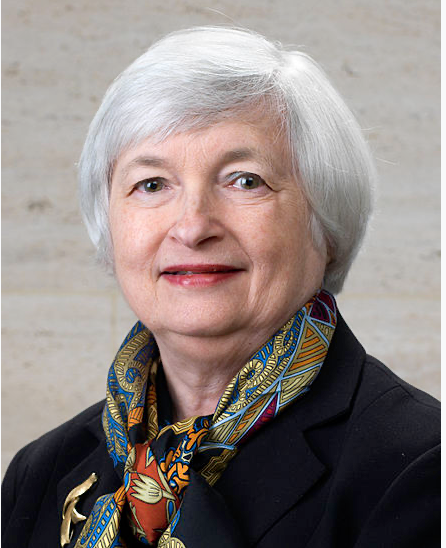
President-elect Joe Biden announced he would nominate Janet Yellen to serve as Secretary of the Treasury.
She would be the first woman to hold this position if confirmed by the Senate.
The position: Advises on economic policy and the financial system.
Janet Louise Yellen was born in 1946 to a Polish Jewish family in the Bay Ridge neighborhood of New York City’s Brooklyn borough, where she also grew up.
Her mother was a teacher and her father was a family physician, working out of his home. She graduated from local Fort Hamilton High School as a valedictorian.
Yellen graduated summa cum laude and Phi Beta Kappa from Pembroke College in Brown University with a degree in economics in 1967.
She received her Ph.D. in economics from Yale University in 1971, the only woman in that doctoral class. Her dissertation was titled “Employment, Output and Capital Accumulation in an Open Economy: A Disequilibrium Approach” [Disequilibrium: a loss or lack of equilibrium or stability, especially in relation to supply, demand, and prices.]
After receiving her doctorate, Yellen was an assistant professor at Harvard from 1971–76.
In 1977, she was recruited to become an economist with the Federal Reserve Board of Governors, where she was assigned to research international monetary reform.
Beginning in 1980, Yellen joined the faculty at the University of California, Berkeley to conduct macroeconomics research and teach MBA and undergraduate students.
During her time as Chair of the Council of Economic Advisors from 1997 to 1999, Yellen oversaw a landmark study focused on the gender pay divide in June 1998.
Within this study, the Council analyzed data from 1969 to 1996 to determine the cause for women to earn substantially less than men. By observing trends attributable to issues like occupation/industry as well as familial status, it was determined that while the Equal Pay Act of 1963 was a step forward, there was no explanation as to why there was a 75 percent difference between average pay for women and men. It was concluded that this gap had no correlation with differences in productivity and, as such, was the repercussions of discrimination within the workforce.
She chaired the Council of Economic Advisers from 1997 to 1999.
Yellen was elected a fellow of the American Academy of Arts and Sciences in 2001.
She was a fellow of the Yale Corporation from 2000 to 2006.
She served as President of the Federal Reserve Bank of San Francisco from 2004 to 2010.
Yellen was a member of the Federal Reserve Board of Governors again from 2010 to 2018.
Yellen served as the vice-chair of the Federal Reserve from 2010 to 2014 and the 15th chair from 2014 to 2018, the first woman to hold the role.
Once in office, Yellen began the process of reversing some of the policies that had been enacted in response to the subprime mortgage crisis of 2008. Notably, she oversaw a program to sell Treasury and mortgage bonds that the Fed had purchased to stimulate the economy. Her tenure was also noted for job and wage growth, both of which occurred while she maintained low interest rates.
After the election of President Donald Trump in November 2016, Yellen argued that it would be inappropriate to weaken or repeal the Dodd–Frank Wall Street Reform and Consumer Protection Act.
She is now a professor emerita at the University of California, Berkeley’s Haas School of Business where she was named Eugene E. and Catherine M. Trefethen Professor of Business and Professor of Economics.
She has been awarded the Haas School’s outstanding teaching award twice.
Yellen is married to George Akerlof, economist, Nobel Memorial Prize in Economic Sciences laureate, professor at Georgetown University, and professor emeritus at the University of California, Berkeley.
Yellen and Akerlof have collaborated on research, including topics such as poverty and unemployment.
Both frequently state that their lone disagreement is that she is a bit more supportive of free trade than he is.